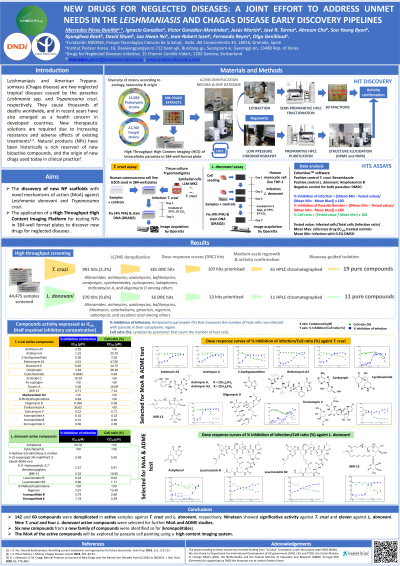Frontiers in Technology
Poster Session B
(1071-B) New Drugs for Neglected Diseases: a joint effort to address unmet needs in the Leishmaniasis and Chagas Disease early discovery pipelines.
Wednesday, May 29, 2024
10:30 - 11:15 CEST
Location: Exhibit Hall

- MP
Mercedes Perez-Bonilla (she/her/hers)
Fundacion MEDINA
Fundacion MEDINA
Granada, Andalucia, Spain
Poster Presenter(s)
Abstract: The neglected tropical diseases Leishmaniasis and American Trypanosomiasis (Chagas disease) caused by the parasites Leishmania spp. and Trypanosoma cruzi, respectively, cause thousands of deaths worldwide, and in recent years they have also emerged as a health concern in developed countries. New therapeutic solutions are required due to increasing resistance and adverse effects of existing treatments1,2. Natural products (NPs) have been historically a rich reservoir of new bioactive compounds, originating new drugs used today in clinical practice3.
With the aim of discovering new NP scaffolds with novel mechanism of action (MoA) against Leishmania and T. cruzi, a high content imaging screen (HCS) against intracellular L. donovani and T. cruzi developed at IPK has been run with 40K representative microbial extracts from MEDINA’s NP collection. Active hits were subjected to LC/MS dereplication and the most promising ones prioritized, the activities confirmed from medium scale cultivations and the best candidates selected for bioassay-guided isolation of the active molecules and structural elucidation using LC/HRMS and NMR approaches. Non-cytotoxic compounds have been profiled in an innovative HCS parasite painting assay, to be developed in parallel, to propose potential MoA for the selected compounds.
From the 40K microbial extracts screened on HCS intracellular parasite models of T. cruzi and Leishmania, we have identified 991 (2.2%) and 270 (0.6%) active hits against T. cruzi and Leishmania respectively. After chromatographic fractionation of the most promising hits, a total of 17 and 13 pure bioactive compounds against T. cruzi and L. donovani, respectively, have been isolated so far. Among them, 8 and 7 active compounds against T. cruzi and L. donovani, respectively, were selected for further MoA and ADME profiling studies.
Acknowledgements: This research was funded by “la Caixa” Foundation grant number HR20-00584. We also thank UK aid, UK, the Dutch Ministry of Foreign Affairs (DGIS), the Netherlands; and the Federal Ministry of Education and Research (BMBF) through KfW, Germany, for supporting via DNDi the bioassays run at Institut Pasteur Korea.
References
1.No, J. H., 2016. Acta Trop. 115, 113-123.
2.Pérez-Molina, J. A., Molina, I., 2018. Lancet, 391, 82-94.
3.Newman, D. J., Cragg, G. M., 2020. J. Nat. Prod., 83, 770–803.
With the aim of discovering new NP scaffolds with novel mechanism of action (MoA) against Leishmania and T. cruzi, a high content imaging screen (HCS) against intracellular L. donovani and T. cruzi developed at IPK has been run with 40K representative microbial extracts from MEDINA’s NP collection. Active hits were subjected to LC/MS dereplication and the most promising ones prioritized, the activities confirmed from medium scale cultivations and the best candidates selected for bioassay-guided isolation of the active molecules and structural elucidation using LC/HRMS and NMR approaches. Non-cytotoxic compounds have been profiled in an innovative HCS parasite painting assay, to be developed in parallel, to propose potential MoA for the selected compounds.
From the 40K microbial extracts screened on HCS intracellular parasite models of T. cruzi and Leishmania, we have identified 991 (2.2%) and 270 (0.6%) active hits against T. cruzi and Leishmania respectively. After chromatographic fractionation of the most promising hits, a total of 17 and 13 pure bioactive compounds against T. cruzi and L. donovani, respectively, have been isolated so far. Among them, 8 and 7 active compounds against T. cruzi and L. donovani, respectively, were selected for further MoA and ADME profiling studies.
Acknowledgements: This research was funded by “la Caixa” Foundation grant number HR20-00584. We also thank UK aid, UK, the Dutch Ministry of Foreign Affairs (DGIS), the Netherlands; and the Federal Ministry of Education and Research (BMBF) through KfW, Germany, for supporting via DNDi the bioassays run at Institut Pasteur Korea.
References
1.No, J. H., 2016. Acta Trop. 115, 113-123.
2.Pérez-Molina, J. A., Molina, I., 2018. Lancet, 391, 82-94.
3.Newman, D. J., Cragg, G. M., 2020. J. Nat. Prod., 83, 770–803.
